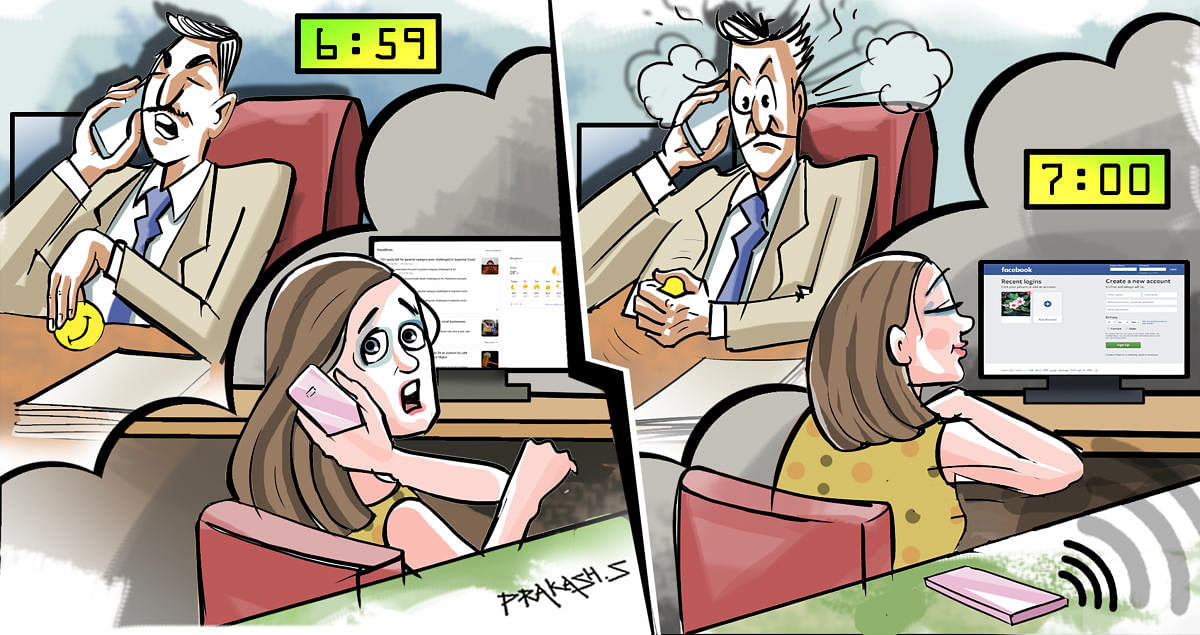
This is perhaps one of the few occasions when the young working population felt truly represented in the Parliament.
Supriya Sule, Nationalist Congress Party MP, has introduced a Private Member’s Bill in the Lok Sabha seeking for employees the right to not respond to communication from employers outside of office hours and on holidays.
We don’t know which section of the working population the bill aims to address at but from the looks of it, it is the white-collar, IT and MNC employees who will benefit from this the most.
But what if it was extended to other professions as well? Metrolife imagines…
PS: No resemblance to any character, alive or dead, is intentional.
Policemen
Imagine this scenario: the phone is ringing at the police station but the inspector looks at the clock and shrugs. To a subordinate’s dismayed query, he says, “My work is done. We will catch the thief tomorrow.”
Doctors
They have to be on standby in case of emergencies; we shudder to imagine what would happen if they refused to pick up emergency calls. “You have reached the voicemail of the big doctor. If you are a patient, please hang in there till morning, when my shift begins again.”
FnB managers
Even if they leave the hotel or restaurant, they have to be ready to douse the fire in case of unforeseen incidents. If this rule applies to them, they can choose to calmly ignore the ringing phone, sip on a glass of wine and stare out of the window; just when an irate guest smashes an expensive vase in the hotel (remember Revathi in the Malayalam movie ‘Kilukkam’?)
Firemen
Ban pun alert: a situation when they don’t answer calls would be ‘lit’.
Scientists
All rocket launches should be planned before 7 pm please. Imagine the technical team has a query at a critical juncture and the senior scientist refuses to answer the phone. “Like okay, the rocket will just hang out at Mars till the doubt is cleared.”
Journalists
Let’s take the opportunity to place some personal grudges on record here. For people like us, who don’t really switch off from work, the bill might mean no breaking news after 7 pm, no unearthing of illegal activities or scams after office hours and no late night assignments. Also, there are some sections for whom this bill is not applicable; for example, officials at government offices like Bescom. They seem to be out of office the entire day anyway, no calls are unanswered.
Also most Ola and Uber drivers — we never get our calls answered at the first try.
What a HR chief thinks
Smita, assistant general manager of HR in a reputed company, says the restrictions would work for well-established companies but not for startups.
“Naturally the timeframe for finishing work in a startup keeps getting extended and we keep getting calls. In a proper full-fledged company, the processes are set. They don’t work after office hours nowadays. It totally depends on which industry and job they are in,” she told Metrolife.
About whether a law would deter employers, Smita is sceptical.
“If there is something to be cleared, they will call. If I don’t answer my boss’s calls at night, I know I will get it from him the next day,” she says.
On a serious note: here are some key points mentioned in the bill...
- ‘Right to disconnect’ means the employee is not obliged to reply to employer’s calls or emails after work hours or on holidays.
- No disciplinary action can be taken against any employee who refuses to answer any call during out-of-work hours.
- If an employee works beyond work hours—mutually agreed—overtime should be paid at the prescribed rates.
- Sule talked about ‘telepressure’—the urge constantly to respond to calls and emails—and how it has destroyed the work-life balance of many. She says it has caused them to be stressed and emotionally exhausted (tell us about it!).
- She quoted a 2014 study by Stanford University which highlighted a dip in productivity after 50-hour work weeks and the adverse effect on sleep because of office calls after 9 pm.
- The Bill also says the government should provide employee counselling, open digital detox centres, and do everything possible “to free an employee from digital distractions and enable him to truly connect with the people around him”.
- The Bill, introduced in the Lok Sabha on the last day of the winter session, is likely to lapse as it is the last sitting before the general elections (yes, it was too good to be true!).